Motivation
- 格式:ppt
- 大小:3.77 MB
- 文档页数:32
![Motivation- lecture 5[1] 大学课件](https://uimg.taocdn.com/9f6644ed852458fb760b5653.webp)
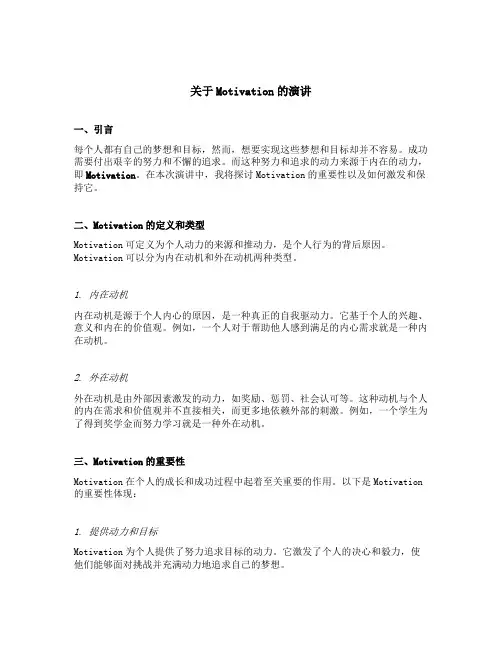
关于Motivation的演讲一、引言每个人都有自己的梦想和目标,然而,想要实现这些梦想和目标却并不容易。
成功需要付出艰辛的努力和不懈的追求。
而这种努力和追求的动力来源于内在的动力,即Motivation。
在本次演讲中,我将探讨Motivation的重要性以及如何激发和保持它。
二、Motivation的定义和类型Motivation可定义为个人动力的来源和推动力,是个人行为的背后原因。
Motivation可以分为内在动机和外在动机两种类型。
1. 内在动机内在动机是源于个人内心的原因,是一种真正的自我驱动力。
它基于个人的兴趣、意义和内在的价值观。
例如,一个人对于帮助他人感到满足的内心需求就是一种内在动机。
2. 外在动机外在动机是由外部因素激发的动力,如奖励、惩罚、社会认可等。
这种动机与个人的内在需求和价值观并不直接相关,而更多地依赖外部的刺激。
例如,一个学生为了得到奖学金而努力学习就是一种外在动机。
三、Motivation的重要性Motivation在个人的成长和成功过程中起着至关重要的作用。
以下是Motivation 的重要性体现:1. 提供动力和目标Motivation为个人提供了努力追求目标的动力。
它激发了个人的决心和毅力,使他们能够面对挑战并充满动力地追求自己的梦想。
2. 增强自信和积极性Motivation能够增强个人的自信心和积极性。
当一个人有着强大的内在动力时,他们更有可能相信自己的能力,并且更积极地迎接新的挑战。
3. 克服困难和挫折Motivation能够帮助个人克服困难和挫折。
在追求目标的过程中,个人可能会面临许多困难和挑战,但有着强大的动力可以使他们坚持下去,不断尝试和改进。
4. 实现个人潜力Motivation使个人能够发挥出自身的潜力。
它激发了个人的创造力和创新能力,使他们能够进一步发展和提升自己的能力。
四、激发和保持Motivation的方法现在我来分享一些激发和保持Motivation的方法,希望能对大家有所启发。

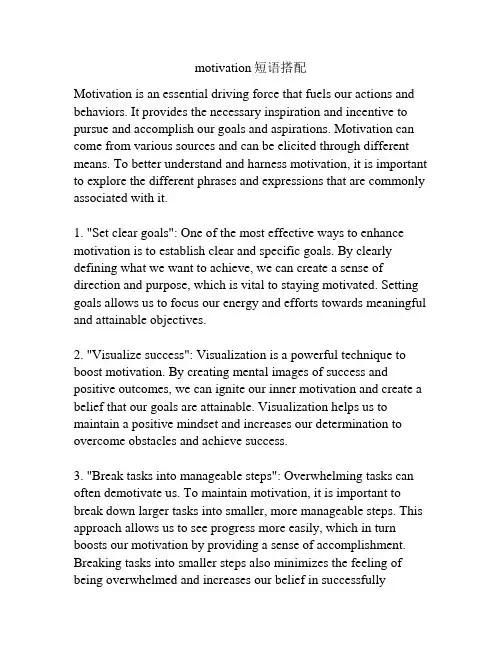
motivation短语搭配Motivation is an essential driving force that fuels our actions and behaviors. It provides the necessary inspiration and incentive to pursue and accomplish our goals and aspirations. Motivation can come from various sources and can be elicited through different means. To better understand and harness motivation, it is important to explore the different phrases and expressions that are commonly associated with it.1. "Set clear goals": One of the most effective ways to enhance motivation is to establish clear and specific goals. By clearly defining what we want to achieve, we can create a sense of direction and purpose, which is vital to staying motivated. Setting goals allows us to focus our energy and efforts towards meaningful and attainable objectives.2. "Visualize success": Visualization is a powerful technique to boost motivation. By creating mental images of success and positive outcomes, we can ignite our inner motivation and create a belief that our goals are attainable. Visualization helps us to maintain a positive mindset and increases our determination to overcome obstacles and achieve success.3. "Break tasks into manageable steps": Overwhelming tasks can often demotivate us. To maintain motivation, it is important to break down larger tasks into smaller, more manageable steps. This approach allows us to see progress more easily, which in turn boosts our motivation by providing a sense of accomplishment. Breaking tasks into smaller steps also minimizes the feeling of being overwhelmed and increases our belief in successfullycompleting the task.4. "Embrace challenges": Challenges are inevitable in any pursuit, but how we perceive and respond to them can greatly impact our level of motivation. Embracing challenges and viewing them as opportunities for growth can be a powerful motivator. Challenges push us beyond our comfort zones, and overcoming them instills a sense of achievement and satisfaction that propels us forward. Viewing challenges as stepping stones rather than roadblocks can fuel our motivation to persist and succeed.5. "Celebrate milestones": Recognizing and celebrating milestones along the way is crucial for maintaining motivation. Each small achievement serves as a marker of progress and reminds us of how far we have come. Celebrating milestones provides a sense of validation and reinforces our belief in our abilities, motivating us to continue striving towards our ultimate goal.6. "Surround yourself with positive influences": Motivation can be contagious, and surrounding ourselves with positive influences can greatly impact our own level of motivation. Interacting with like-minded individuals, mentors, or role models who exude motivation can inspire and energize us. The positive energy and support from others can provide a much-needed boost to our own motivation levels.7. "Create a supportive environment": Our physical and social environment plays a significant role in our motivation. Creating an environment that supports and reinforces our goals is essential. This can include organizing our workspace, establishing routines,and minimizing distractions. A supportive environment promotes focus, discipline, and motivation.8. "Persist through setbacks": Setbacks are a natural part of any journey, and how we respond to them can significantly impact our motivation. Instead of being discouraged by setbacks, it is important to view them as learning experiences and opportunities for growth. Maintaining a resilient attitude and persisting through setbacks can strengthen our motivation and belief in eventual success.9. "Find intrinsic motivation": Intrinsic motivation refers to the internal drive that comes from within, rather than external rewards or pressures. Discovering what truly inspires and excites us at a deep level can fuel our motivation in a more sustainable manner. Understanding our intrinsic motivations can help us align our goals and actions with our values and passions, creating a strong and lasting source of motivation.10. "Reflect on progress": Regularly reflecting on our progress is essential for maintaining motivation. Taking the time to evaluate how far we have come and the obstacles we have overcome can reignite our motivation. Reflection allows us to appreciate our growth, identify areas for improvement, and adjust our strategies accordingly, all of which contribute to keeping our motivation levels high.In conclusion, motivation is a multifaceted concept that can be nurtured and enhanced through various means. By incorporating these phrases and expressions into our daily lives and pursuits, wecan cultivate and sustain our motivation, enabling us to achieve our goals and lead fulfilling lives.。
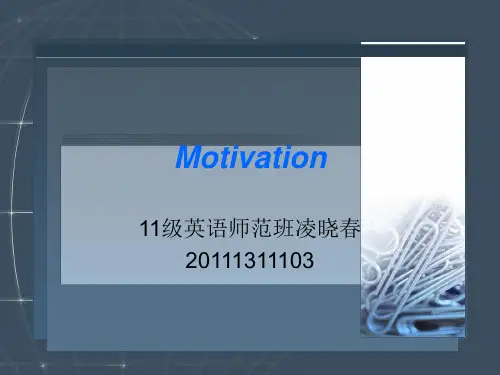
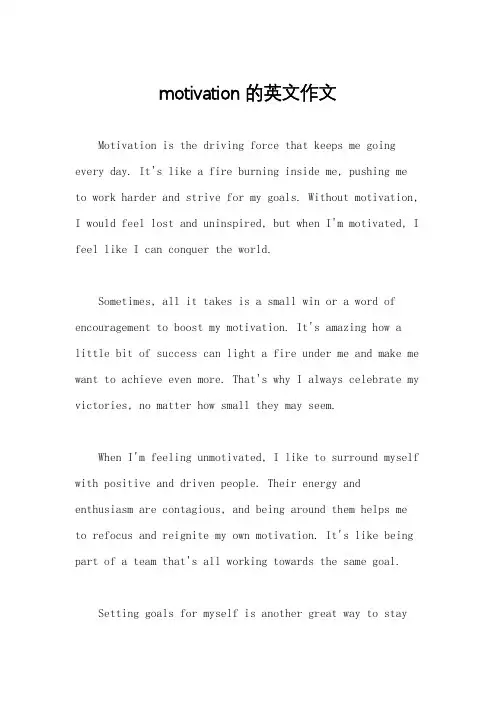
motivation的英文作文Motivation is the driving force that keeps me going every day. It's like a fire burning inside me, pushing me to work harder and strive for my goals. Without motivation, I would feel lost and uninspired, but when I'm motivated, I feel like I can conquer the world.Sometimes, all it takes is a small win or a word of encouragement to boost my motivation. It's amazing how a little bit of success can light a fire under me and make me want to achieve even more. That's why I always celebrate my victories, no matter how small they may seem.When I'm feeling unmotivated, I like to surround myself with positive and driven people. Their energy and enthusiasm are contagious, and being around them helps me to refocus and reignite my own motivation. It's like being part of a team that's all working towards the same goal.Setting goals for myself is another great way to staymotivated. When I have something to work towards, I feel more driven and focused. It's like having a roadmap that guides me towards success, and each step I take brings me closer to my ultimate destination.Of course, there are times when I feel discouraged and my motivation wanes. During these moments, I remind myself of why I started in the first place and the passion that drives me. I also take a break and do something I enjoy, whether it's going for a run, reading a book, or spending time with loved ones. These activities help me to recharge and come back with renewed motivation and energy.In the end, motivation is what keeps me going, even when the going gets tough. It's the fuel that powers my journey towards success, and I'm grateful for its presence in my life.。

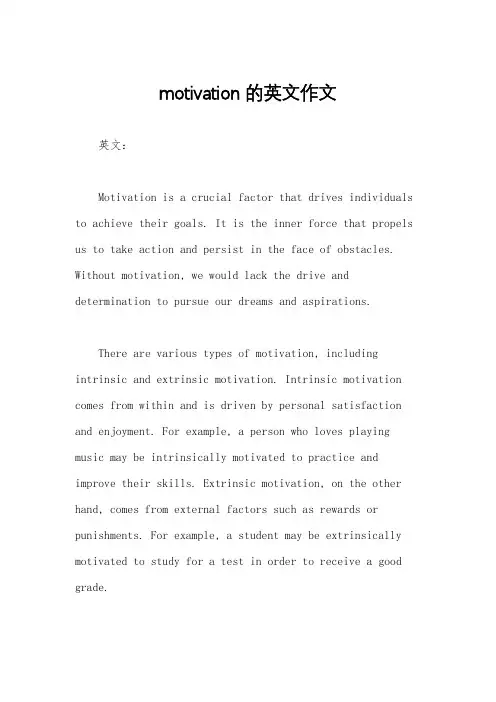
motivation的英文作文英文:Motivation is a crucial factor that drives individuals to achieve their goals. It is the inner force that propels us to take action and persist in the face of obstacles. Without motivation, we would lack the drive and determination to pursue our dreams and aspirations.There are various types of motivation, including intrinsic and extrinsic motivation. Intrinsic motivation comes from within and is driven by personal satisfaction and enjoyment. For example, a person who loves playing music may be intrinsically motivated to practice and improve their skills. Extrinsic motivation, on the other hand, comes from external factors such as rewards or punishments. For example, a student may be extrinsically motivated to study for a test in order to receive a good grade.In my experience, I have found that intrinsic motivation is much more powerful and long-lasting than extrinsic motivation. When we are intrinsically motivated, we are more likely to enjoy the process of working towards our goals and feel a sense of fulfillment when we achieve them. In contrast, extrinsic motivation can feel like a chore or obligation, and once the reward is received, the motivation often fades.However, it is important to note that motivation is not constant and can fluctuate depending on various factors such as mood, environment, and external pressures. Therefore, it is important to cultivate a growth mindset and develop strategies to maintain motivation during challenging times.中文:动力是推动个人实现目标的关键因素。
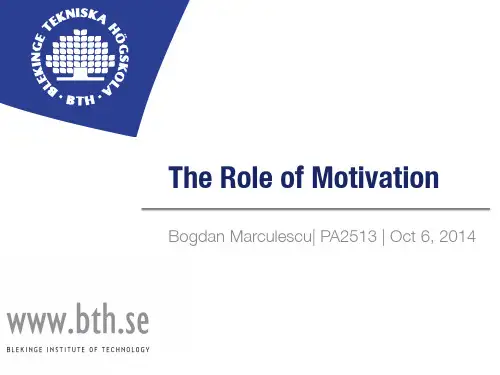
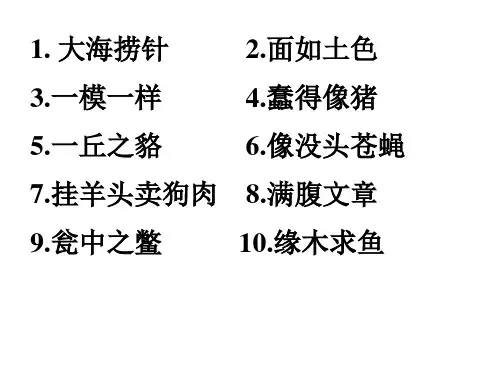
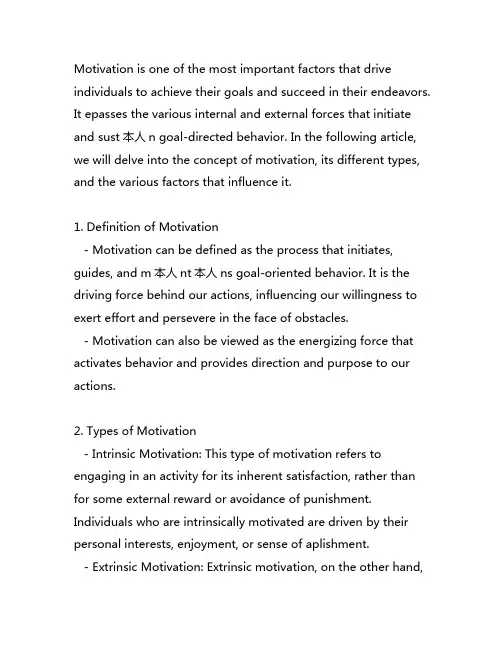
Motivation is one of the most important factors that drive individuals to achieve their goals and succeed in their endeavors. It epasses the various internal and external forces that initiate and sust本人n goal-directed behavior. In the following article, we will delve into the concept of motivation, its different types, and the various factors that influence it.1. Definition of Motivation- Motivation can be defined as the process that initiates, guides, and m本人nt本人ns goal-oriented behavior. It is the driving force behind our actions, influencing our willingness to exert effort and persevere in the face of obstacles.- Motivation can also be viewed as the energizing force that activates behavior and provides direction and purpose to our actions.2. Types of Motivation- Intrinsic Motivation: This type of motivation refers to engaging in an activity for its inherent satisfaction, rather than for some external reward or avoidance of punishment. Individuals who are intrinsically motivated are driven by their personal interests, enjoyment, or sense of aplishment.- Extrinsic Motivation: Extrinsic motivation, on the other hand,involves engaging in an activity in order to earn a reward or avoid a punishment. This type of motivation is often driven by external factors such as incentives, recognition, or social approval.- Amotivation: Amotivation refers to the absence of motivation. Individuals who are amotivated lack the desire to engage in goal-directed behavior and may feel apathetic or indifferent towards their pursuits.3. Factors Affecting Motivation- Individual Differences: People differ in their levels of motivation due to individual factors such as personality tr本人ts, beliefs, values, and needs. For example, individuals with a high need for achievement may be more motivated to pursue challenging goals.- Environmental Factors: The environment in which individuals operate can have a significant impact on their motivation. Supportive and nurturing environments can enhance motivation, while negative or restrictive environments can diminish it.- Goal Characteristics: The nature of the goals individuals are pursuing can also influence their motivation. Clear, challenging, and personally meaningful goals are more likely to elicit high levels of motivation.4. The Importance of Motivation- Motivation plays a crucial role in driving individuals towards achieving their goals and realizing their potential. It sust本人ns effort over time and helps individuals ovee obstacles and setbacks.- Motivation is also integral to the performance of individuals in various dom本人ns, including education, work, sports, and personal development. Highly motivated individuals are more likely to exhibit persistence, resilience, and a willingness to put in the effort required to succeed.- In organizational settings, motivation is essential for enhancing employee engagement, productivity, and job satisfaction. It can lead to higher levels of performance and overall success for the organization.5. Strategies for Enhancing Motivation- Set Clear and Att本人nable Goals: Establishing specific, challenging, and achievable goals can enhance motivation by providing individuals with a clear sense of direction and purpose.- Provide Feedback and Recognition: Regular feedback and recognition for achievements can bolster motivation bysignaling progress and reinforcing desired behaviors.- Foster a Supportive Environment: Creating an environment that is supportive, encouraging, and conducive to growth can help to sust本人n motivation and foster a sense of belonging andpetence.In conclusion, motivation is a multifaceted concept that influences our behaviors, drives us towards our goals, and sust 本人ns our efforts over time. Understanding the different types of motivation and the factors that influence it can help individuals and organizations cultivate an environment that fosters high levels of motivation and achievement. By recognizing the importance of motivation and implementing strategies to enhance it, individuals can optimize their potential and work towards realizing their aspirations.。
motivation的用法如何有效利用动力激发个人潜能和提高工作绩效简介:在现代社会中,动力被视为推动个人激情和实现工作目标的重要因素。
然而,许多人并不清楚如何有效地利用动力来激发个人潜能和提高工作绩效。
本文将探讨动力的定义、不同类型的动力以及如何有效利用动力来激发个人潜能和提高工作绩效。
一、动力的定义及重要性动力是指个体追求某种目标的驱动力。
它能够激发个人的动机,增强个体的热情和积极性。
提供合适的动力对于个人潜能的开发和工作绩效的提高至关重要。
因此,了解动力的不同类型和如何有效利用动力是提高工作效率和个人发展的关键。
二、不同类型的动力1. 内在动力内在动力指的是个体内部的推动力量,基于个人对工作的热情和兴趣。
这种动力源于对工作任务的自我价值和成就感的追求。
例如,一个热爱音乐的人可能会找到一份与音乐相关的工作,并通过这份工作得到满足感和成就感。
2. 外在动力外在动力是源于外部因素的推动力量,例如薪酬、晋升机会或他人的认可。
这种动力驱使个体为了获得这些外部激励而努力工作。
尽管外在动力可以激发人们的积极性,但过度依赖外在动力可能会导致个体在失去激励源后意志消沉。
三、如何有效利用动力来激发个人潜能和提高工作绩效1. 设定明确的目标设定明确的目标有助于个人明确工作的方向和所需的努力程度。
这些目标应当具体、可测量、可行和与个人价值观相一致。
合理设定的目标能够激发个人的内在动力,促使个体更有动力地追求目标。
2. 监督个人进展个人进展的监督有助于发现和纠正潜在的问题,并为个体提供改进的机会。
通过定期评估个人的工作表现,个体能够获得反馈并及时调整自己的工作方式。
这种自我监督能够激发个体的内在动力,促进个人潜能的发挥和工作绩效的提高。
3. 提供有意义的反馈和奖励合理的反馈和奖励可以增强个人的积极性和动力。
个体应当获得及时、准确的反馈,以了解自己的工作表现和改进的空间。
此外,适当的奖励也能够激发个体的外在动力,例如奖金、晋升或公开表彰。
motivation英文作文英文回答:Motivation is a complex and multifaceted concept that has been studied by philosophers, psychologists, and scientists for centuries. There is no single definition of motivation, but it is generally understood to be theinternal drive that compels us to act. Motivation can be either intrinsic or extrinsic. Intrinsic motivation comes from within, and is driven by our own interests and desires. Extrinsic motivation comes from outside of us, and isdriven by rewards or punishments.There are many different theories of motivation, eachof which attempts to explain how motivation works. Some of the most well-known theories include:Maslow's Hierarchy of Needs: This theory suggests that humans have a hierarchy of needs, and that we are motivated to satisfy our needs in a particular order. The most basicneeds, such as food and shelter, must be met before we can move on to higher-level needs, such as self-esteem andself-actualization.Herzberg's Two-Factor Theory: This theory suggeststhat there are two types of factors that motivate employees: hygiene factors and motivators. Hygiene factors are factors that prevent dissatisfaction, such as salary and working conditions. Motivators are factors that lead to satisfaction, such as recognition and achievement.Vroom's Expectancy Theory: This theory suggests that motivation is determined by three factors: expectancy, instrumentality, and valence. Expectancy is the belief that effort will lead to performance. Instrumentality is the belief that performance will lead to rewards. Valence isthe value that we place on the rewards.Motivation is essential for success. It is what drives us to set goals, work hard, and achieve our potential. When we are motivated, we are more likely to be productive, creative, and successful.中文回答:动机是一个复杂且多方面的概念,几个世纪以来一直受到哲学家、心理学家和科学家的研究。